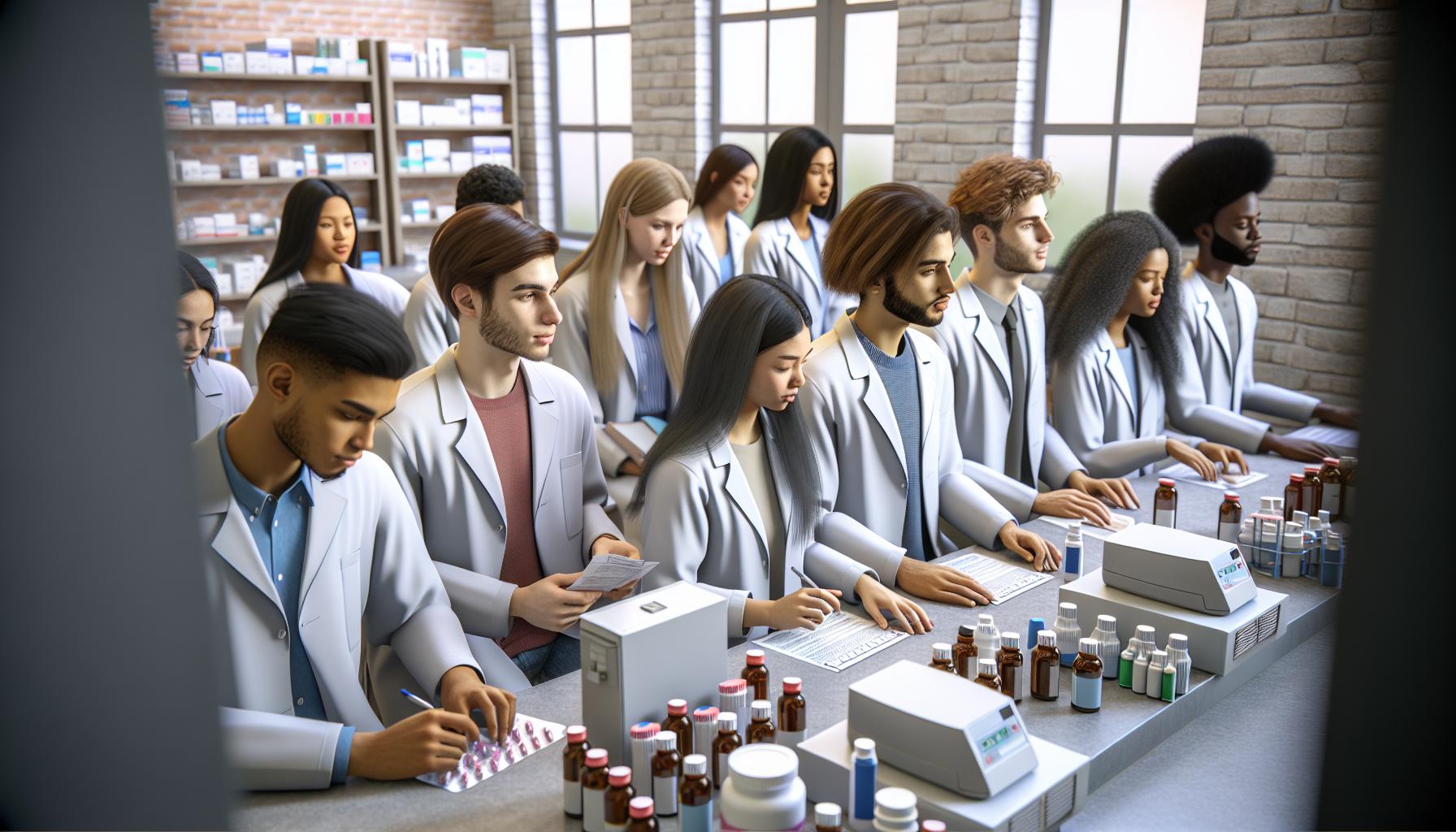Becoming a pharmacy technician offers an exciting career path in healthcare with promising job prospects and competitive salaries. For those interested in pursuing this field, understanding the duration of pharmacy technician programs is crucial for career planning. The length of pharmacy tech programs varies depending on several factors including the type of certification, educational institution, and program format. While some students can complete their training in as little as four months others may spend up to two years earning an associate degree. These programs combine classroom instruction with hands-on training to prepare students for success in retail pharmacies hospitals and other healthcare settings.
How Long Are Pharmacy Tech Programs
Pharmacy technician education offers two primary paths: certificate programs and associate degree programs. Each option provides distinct advantages based on career goals and time investment preferences.
Certificate Programs
Certificate programs provide focused pharmacy technician training in 4-12 months. These programs include essential coursework in:
- Pharmaceutical calculations
- Medical terminology
- Pharmacy law & ethics
- Medication safety protocols
- Sterile compounding techniques
The curriculum combines classroom instruction with 120-240 hours of hands-on clinical training in pharmacy settings. Certificate programs cost $2,000-$5,000 and often feature flexible scheduling options including evening classes online learning modules.
Associate Degree Programs
Associate degree programs offer comprehensive pharmacy education over 18-24 months. The curriculum encompasses:
- Advanced pharmaceutical sciences
- Anatomy & physiology
- Healthcare business operations
- Insurance & billing procedures
- Interprofessional communication
These programs require 60-70 credit hours including:
| Component | Hours |
|---|---|
| General Education | 20-25 |
| Core Pharmacy Courses | 30-35 |
| Clinical Rotations | 10-15 |
Associate degrees cost $6,000-$15,000 depending on the institution. Graduates earn higher starting salaries averaging $2-3 more per hour than certificate holders based on Department of Labor statistics.
Typical Program Duration Requirements

The duration of pharmacy technician programs varies based on enrollment status and clinical training requirements. Program completion timelines depend on several key factors including study format and required hands-on experience.
Full-Time vs Part-Time Options
Full-time pharmacy tech programs offer accelerated completion in 4-12 months for certificates or 18-24 months for associate degrees. Part-time programs extend these timeframes by 50-100%, with certificate programs taking 8-18 months and associate degrees requiring 24-36 months. Online programs provide flexible scheduling options, allowing students to complete coursework during evenings or weekends while maintaining employment.
- Retail pharmacies: 60-80 hours of customer service training
- Hospital pharmacies: 80-100 hours of institutional medication preparation
- Compounding facilities: 40-60 hours of specialized medication creation
- Long-term care facilities: 20-40 hours of geriatric pharmacy practice
| Program Type | Minimum Clinical Hours | Maximum Clinical Hours | Average Completion Time |
|---|---|---|---|
| Certificate | 120 hours | 180 hours | 4-6 weeks |
| Associate Degree | 180 hours | 240 hours | 8-12 weeks |
Factors Affecting Program Length
The duration of pharmacy technician programs varies based on several key factors that impact the overall completion time. These factors determine whether a student completes their training in as little as 4 months or requires up to 24 months.
Prior Education Credits
Previous academic achievements directly influence program length through credit transfers. Students with relevant coursework in biology, chemistry or healthcare reduce their program duration by 2-3 months. Transfer credits from accredited institutions apply to:
- General education requirements like English composition or mathematics
- Basic science courses including anatomy or medical terminology
- Introductory healthcare courses such as medical ethics or patient care
State Requirements
Each state’s board of pharmacy establishes specific training requirements that affect program duration:
- California mandates 240 hours of practical training
- Florida requires 160 hours of supervised work experience
- Texas specifies 200 hours of pharmacy-based training
- New York demands 180 hours of clinical rotation
- Online programs offer flexible scheduling with 24/7 access to coursework
- Traditional campus programs follow fixed semester schedules
- Hybrid programs combine online lectures with in-person labs
- Accelerated online formats compress 12-month curricula into 6-8 months
- Virtual clinical simulations reduce practical training time by 20-30%
| Program Format | Minimum Duration | Maximum Duration |
|---|---|---|
| Traditional | 6 months | 24 months |
| Online | 4 months | 18 months |
| Hybrid | 5 months | 20 months |
Core Curriculum Components
Pharmacy technician programs integrate three essential educational components to develop competent healthcare professionals. Each component builds specific skills required for pharmacy practice.
Classroom Learning
Classroom instruction covers fundamental pharmaceutical knowledge through structured coursework:
- Medical terminology for accurate medication identification
- Pharmaceutical calculations for precise dosage measurements
- Pharmacy law compliance for legal medication dispensing
- Drug classifications including generic brand equivalents
- Insurance processing procedures for billing accuracy
- Medication safety protocols for error prevention
Laboratory Training
Laboratory sessions provide hands-on experience with equipment in simulated pharmacy settings:
- Prescription processing using pharmacy software systems
- Sterile compounding techniques in clean room environments
- Medication packaging with automated dispensing machines
- Inventory management through barcode scanning systems
- Quality control procedures for medication verification
- Aseptic technique practice with IV preparation equipment
- 120-240 supervised training hours in retail pharmacies
- Direct patient interaction for prescription consultation
- Medication order processing in hospital settings
- Inventory control system operation
- Electronic health record documentation
- Collaboration with licensed pharmacists
| Component | Duration (Hours) | Setting Type |
|---|---|---|
| Classroom | 300-400 | Academic Institution |
| Laboratory | 100-150 | Simulated Pharmacy |
| Externship | 120-240 | Working Pharmacy |
Certification and Licensing Timeline
The certification and licensing process for pharmacy technicians follows distinct timelines based on national and state requirements. Candidates must complete both educational prerequisites and standardized examinations to achieve full certification.
National Certification Process
National certification through the Pharmacy Technician Certification Board (PTCB) requires 3-4 months from application to certification. Here’s the timeline breakdown:
- Application review: 5-7 business days
- Exam scheduling window: 45-60 days
- Exam results processing: 1-2 business days
- Certificate issuance: 7-10 business days
- Background check completion: 2-3 weeks
| Certification Step | Timeline |
|---|---|
| Application Review | 5-7 days |
| Exam Scheduling | 45-60 days |
| Results Processing | 1-2 days |
| Certificate Issuance | 7-10 days |
| Background Check | 2-3 weeks |
State-Specific Requirements
State licensing timelines vary by jurisdiction with specific documentation requirements:
- Initial registration processing: 2-6 weeks
- Fingerprint clearance: 1-3 weeks
- State board review: 10-15 business days
- License issuance: 5-7 business days
- California: 240 hours of practical training
- Florida: 160 hours of supervised experience
- Texas: 30 hours of continuing education
- New York: 20 hours of state-specific training
| State | Required Training Hours |
|---|---|
| California | 240 hours |
| Florida | 160 hours |
| Texas | 30 hours |
| New York | 20 hours |
Career Advancement Opportunities
Pharmacy technicians access multiple paths for career growth through specialized certifications and advanced training programs. These opportunities enhance expertise and increase earning potential in specialized pharmacy settings.
Specialized Certifications
The Pharmacy Technician Certification Board (PTCB) offers five specialized certifications:
- Compounded Sterile Preparation Technician (CSPT) certification for sterile compounding roles
- Advanced Certified Pharmacy Technician (CPhT-Adv) credential for leadership positions
- Hazardous Drug Management certification for handling dangerous medications
- Medication History certification for patient care settings
- Billing and Reimbursement certification for insurance processing roles
| Certification Type | Training Hours | Validity Period | Average Salary Increase |
|---|---|---|---|
| CSPT | 240 | 3 years | $3-5/hour |
| CPhT-Adv | 300 | 2 years | $4-6/hour |
| Hazardous Drug | 180 | 2 years | $2-4/hour |
| Med History | 160 | 2 years | $2-3/hour |
| Billing | 140 | 2 years | $2-4/hour |
- Nuclear Pharmacy Technology (12-month program)
- Chemotherapy Preparation (6-month certification)
- Clinical Research (9-month specialized training)
- Inventory Management Systems (3-month certification)
- Pharmacy Automation Technology (4-month program)
| Program Type | Duration | Clinical Hours | Career Setting |
|---|---|---|---|
| Nuclear | 12 months | 400 | Radiopharmacy |
| Chemotherapy | 6 months | 200 | Oncology |
| Clinical Research | 9 months | 300 | Research Centers |
| Inventory | 3 months | 80 | Distribution |
| Automation | 4 months | 120 | Hospital Systems |
Becoming a certified pharmacy technician offers a rewarding career path with flexible education options. Students can choose between certificate programs that take 4-12 months or associate degree programs spanning 18-24 months based on their career goals and circumstances. The program duration ultimately depends on factors like enrollment status clinical requirements and state-specific regulations. Whether pursuing traditional online or hybrid formats aspiring pharmacy technicians can find a program that fits their schedule and learning preferences. With competitive salaries specialized certification opportunities and strong job prospects pharmacy technician programs provide a solid foundation for a successful healthcare career. The investment in education whether through a shorter certificate program or comprehensive associate degree leads to valuable career opportunities in various healthcare settings.



